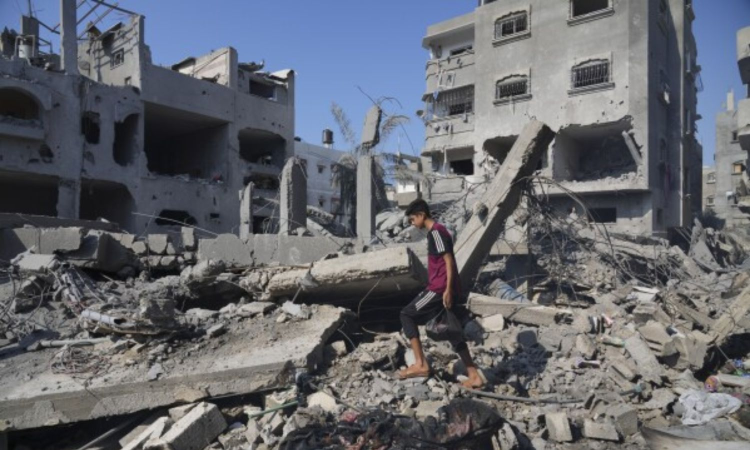Editorial: A measured shift on Gaza
Western media organisations too have been forced to stop hiding behind both-sides coverage.

Desperate search for survivors in Gaza residential building hit by an Israeli airstrike (AP)
Last week, at a UN Security Council debate on the Middle East, India’s Permanent Representative P Harish issued a call for an “immediate ceasefire” in Gaza. This was a perceptible shift of stance after months of spouting pointless moralistic cant, even as Israel reduced Gaza to rubble. So horrendous have been the images of death and starvation emanating from that enclave that even Israel’s facilitators in Western Europe, chiefly the UK, France and Germany, have begun to make faces of shock. Why, the habitual fibber Donald Trump has had to concede the starvation crisis is ‘real’.
Since Israel began its attack on Gaza on Oct. 7, 2023, India has avoided expressing any censure despite the horrors reported from the enclave. Last December, when 153 countries voted in the UN General Assembly for an immediate ceasefire, it abstained. In June 2024, when 149 countries supported a similar resolution, India was among only 19 nations that abstained, arguing for “dialogue and diplomacy.”
But no country claiming to be a civilisation can turn its face away from the horror of daily killings of aid-seekers and starvation deaths of children being reported now. The growing international outrage is forcing Western capitals to act. France announced last week that it would recognise Palestine, joining Spain, Ireland, Norway and others. In Britain, Keir Starmer has been forced to abandon his pro-Israel line under public pressure.
Western media organisations too have been forced to stop hiding behind both-sides coverage. The Guardian, New York Times, and Le Monde have published detailed reports on the starvation deaths, bombed hospitals and the deliberate blockade of aid. Even the BBC has broken its equivocation. In a rare joint statement last week, BBC News, AFP, Reuters and the Associated Press expressed alarm over conditions faced by journalists in Gaza, many of whom are starving along with their families.
India’s statement at the UN must be seen in this context—not as a bold step, but a reluctant nod to a shifting global consensus. It was less a moral awakening than a recalibration of optics.
Sadly, India’s diplomatic prevarication on Gaza has neatly dovetailed into the BJP-led Union government’s polarisation politics. In some pockets of India, the plight of Palestinians is being seen through the lens of antipathy for Muslims. The BJP-led government’s embrace of Israel has fostered an atmosphere where even mild gestures of solidarity with Gaza are viewed with suspicion.
On July 25, the Bombay High Court dismissed a petition filed by the CPI(M) challenging the Mumbai Police’s denial of permission for a Gaza solidarity rally. The court’s remarks, urging petitioners to “be patriots” and “focus on problems affecting India,” reflect an alignment between state institutions and the government’s unspoken narrative: that mourning dead Palestinians is somehow unpatriotic.
Earlier this month, a peaceful protest in Delhi led by civil rights advocate Harsh Mander and economist Jean Drèze was jeered and disrupted by local shopkeepers who saw it as a “pro-Muslim” event. The protestors were not calling for violence or partisanship—they were demanding compassion for civilians, especially children, dying of hunger and bombardment.
This inability to distinguish between humanitarian concern and communal identity is entirely the BJP’s fault. India’s failure on Gaza is not just a foreign policy misstep. It is a moral erosion, both at the level of statecraft and public conscience.



